|
It is learned that at 00:01 on February 4, 2025, Eastern Time, the new tariff policy signed by US President Trump officially came into effect: the United States began to impose a 10% tariff on imports from China and terminated the T86 customs clearance mode. In response, the Chinese government quickly took countermeasures, deciding to impose a 10%-15% tariff on some imported goods from the United States, including coal, liquefied natural gas, crude oil, agricultural machinery, etc., starting from February 10, 2025 . As this war without gunpowder kicked off, cross-border e-commerce was the first to be "hit". The sword of Damocles that has long hung over the heads of cross-border sellers, "cancelling T86 customs clearance", has officially fallen. It is learned that recently, the U.S. Customs and Border Protection (CBP) issued a notice on the new tariff policy. The notice shows that according to the latest executive order, the U.S. Customs confirmed that starting from 00:01 on February 4, Eastern Time, the customs system will reject T86 declarations from China. All goods must be processed using the T01 (formal entry) mode and must pay the corresponding tariffs. Products that fall under only one of the following HTS codes are exempt from additional duties:9903.01.21: Articles originating in China (including Hong Kong, China) donated by persons subject to U.S. jurisdiction, such as food, clothing, and medicine. 9903.01.22: Information materials originating in China (including Hong Kong, China), including but not limited to publications, films, posters, records, photographs, microfilms, microfiche, tapes, CDs, CD ROMs, artworks and newsletters. 9903.01.23: Products originating in China (including Hong Kong, China), other than products described in 9903.01.21 and 9903.01.22 and products for personal use included in carry-on baggage of persons arriving in the United States: 1. Loaded at the loading port before 00:01 EST on February 1, 2025, or transferred by the last mode of transportation before entering the United States; 2. Declare for consumption or withdraw from the warehouse for consumption on or after 00:01 on February 4, 2025, and before 00:01 on March 7, 2025, Eastern Time. An industry insider further interpreted the notice, that is, for all orders of goods shipped from China to the United States that take off after 12:00 Beijing time on February 4, 2025, the original T86 customs clearance model will no longer be applicable, and the final tariffs for various products will be increased by 10%-60%. It is understood that T86 stands for "Type 86", also known as the "small exemption policy", which is a type of customs declaration for imported goods in the United States. According to the customs clearance regulations, low-value goods (no more than US$800) can usually pass customs quickly and are exempt from tariffs and taxes. This policy not only promotes the development of the US import market, but also provides favorable conditions for the rise of China's cross-border e-commerce platforms. According to data from the U.S. Customs and Border Protection, the number of goods entering the United States through the "T86 clearance model" has increased exponentially over the past 10 years, soaring from approximately 139 million pieces in fiscal 2015 to over 1 billion pieces in fiscal 2023, and exceeding 1.36 billion pieces in fiscal 2024. Among them, goods from China's cross-border e-commerce platforms account for about one-third of such packages. However, as Chinese cross-border e-commerce platforms, with the slogan of "ultimate value for money", have grown rapidly in the United States, it has further affected the domestic e-commerce business in the United States. The United States, which has always adopted the economic strategy of "local priority", has gradually tightened the T86 tariff policy in recent years. In June last year, due to the strengthening of the review of the "small exemption" import policy by relevant US departments, many customs clearance companies were forced to suspend T86 customs clearance business. In October of the same year, the US Customs enforced ACAS again, extending the customs clearance time for low-value goods and adding more force majeure risk factors to the customs clearance process of such goods. The official cancellation of the T86 tariff policy is undoubtedly a heavy blow to cross-border sellers who rely on small parcel direct mail and some cross-border e-commerce platforms that mainly sell low-value goods: it not only represents an increase in costs, but also means an increase in compliance risks and operating thresholds. Some industry insiders are worried that the US Customs may trace back to companies that previously used T86 to under-declare or split orders to avoid taxes, leading to legal disputes. However, according to industry sources, the customs system is currently being updated and related fees are expected to be adjusted, but the specific fee details have not yet been fully announced. If there is subsequent news, it will be updated in a timely manner. It is worth mentioning that with the official implementation of the new tariff policy, some logistics companies have adjusted their costs in response to this policy. After the tariff policy came into effect, small packages crossing the border into the United States experienced a brief moment of "chaos." It is learned that affected by the changes in the US import declaration model, a number of domestic logistics companies have recently issued announcements on the adjustment of US tariff policies and service changes, announcing that they will add customs declaration fees and pre-paid tariff deposits for each shipment of goods. Yuntu and 4PX: Starting from 09:00 Beijing time on February 5, the company will charge an additional customs declaration fee of 20 yuan per ticket ; for goods originating from China (including Hong Kong) to the United States and signed in after 09:00 Beijing time on February 5, a 30% tariff deposit will be prepaid when the package is signed in . Yanwen: For flights to the United States departing after 12:00 on February 4, a comprehensive tariff of 35% of the declared value of the parcel will be charged for textiles and clothing, and 25% of the declared value of the parcel will be charged for items other than textiles and clothing. SF Express: Starting from 12:00 Beijing time on February 5, the company will charge an additional customs clearance comprehensive service fee of 20 yuan per ticket; for goods originating from China (including Hong Kong) and heading to the United States that are weighed after 12:00 Beijing time on February 5, a 30% tariff deposit will be pre-collected when the package is weighed. Under this series of new fee adjustment policies, the increase in logistics costs for cross-border sellers is almost a foregone conclusion, so many sellers have said directly: price increases are imminent, otherwise they will lose money on every order . In addition to the fee adjustments of domestic logistics companies, it is also worth noting that the notice issued by the United States Postal Service (USPS) is: starting from February 4, 2025, USPS will suspend the acceptance of international parcels (except letters and surface mail) from China (including Hong Kong, China) until further notice. In the notice, USPS did not explain the reason for the suspension of service, nor did it mention the estimated duration of the suspension, but most people believe that the reason for the suspension of service is related to the new tariff policy of the United States to cancel small exemptions. According to the notice, packages that have entered the USPS system may not be affected, but there is still a possibility of delayed delivery. We would also like to remind relevant sellers and logistics companies to pay more attention to relevant information and notifications in the near future, and respond in time to minimize losses. What do you think about this? Welcome to discuss in the comment area~
|










